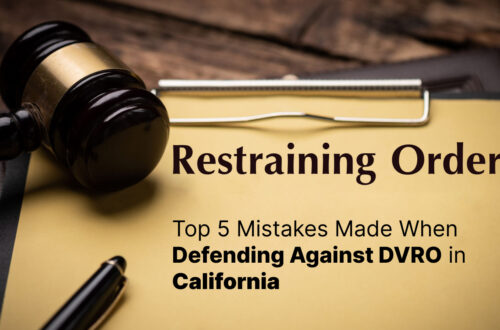Murder is among the most serious criminal offenses, often carrying life-altering consequences like life imprisonment or even the death penalty. But under California law, not all murder charges are treated equally. The state distinguishes between first and second degrees of murder, with significant legal and sentencing differences based on how the crime was committed.
Understanding these distinctions is critical, especially if you or someone you care about is facing homicide charges in California. Former prosecutor and experienced defense attorney Parag Agrawal breaks down the legal definitions, elements, and penalties involved in each degree of murder under California law.
What Does “Degree of Murder” Mean in Law?
The “degree of murder” refers to how a homicide is classified based on the intent, circumstances, and level of premeditation involved.
- First-degree murder typically involves a willful, premeditated, and deliberate killing.
- Second-degree murder is also intentional but not premeditated, or stems from extreme recklessness.
Additionally, California Penal Code § 190.2 outlines “special circumstances” that can elevate a murder charge and result in harsher sentencing, such as life without parole or the death penalty.
What is First-Degree Murder?
First-degree murder is the most serious form of homicide in California. This is often a planned and intentional killing, which means the act was willful, deliberate, and premeditated.
It also applies under the felony murder rule, where a killing occurs during the commission of certain felonies.
Key Element of First Degree Murder
To charge someone with first-degree murder in California, the law looks for certain key elements:
- Intent to Kill: The person planned the killing, and it was not an accident.
- Premeditation: The act was planned or thought about ahead of time, even briefly.
- Deliberation: The decision to kill was made calmly, not in a sudden rage.
- Felony Murder Rule: A murder that happens during serious crimes like robbery or rape can still count as first-degree murder.
Examples of First-degree Murder
Examples of 1st degree murders in California include:
- Planned Killing: Poison a spouse after planning it for days.
- Killing During a Robbery: Shooting a store clerk during a robbery.
- Murder for Financial Gain: Hiring someone to kill a business partner for insurance money.
- Arson-Related Death: Committing arson that causes a fatality.
Penalties and Sentencing in First-degree Murder
If someone is convicted of first-degree murder in California, they face serious punishments, which may include:
- 25 years to life in prison
- Life without the possibility of parole in special circumstances
- The death penalty, though it’s rarely used and is currently under a moratorium in California
What is Second-Degree Murder?
Second-degree murder refers to intentional or reckless killings without premeditation. While still carried out with “malice aforethought,” they are not planned in advance. It includes impulsive actions and those showing reckless disregard for human life.
Key Elements of Second-degree Murder
To charge someone with second-degree murder in California, the law looks for certain key elements:
- No Premeditation/Deliberation: The murder is not deliberately planned, unlike first-degree murder.
- Unlawful Killing: Although the killing is not planned, it is not legally justified or excused.
- Malice Aforethought: Express or implied malice, which is a killing resulting from reckless disregard for human life.
Examples of Second-degree Murder
Examples of 2nd degree murders in California include:
- Spontaneous Altercation: A heated argument escalates into a physical fight, and one person fatally attacks the other.
- Extreme Indifference to Human Life: Firing a gun into a crowd, killing someone.
- Reckless Behavior: Causing death while driving under the influence with knowledge that driving under the influence can cause death.
- Impulsive Killing: Impulsively killing someone in a moment of rage.
Penalties and Sentencing in Second-degree Murder
Although second-degree murder is less serious than first-degree murder, there are still harsh penalties, which may include
- 15 years to life in state prison
- Enhanced sentences if the victim was a peace officer, if a firearm was used, or if the defendant had a prior record
What are the Key Legal Differences Between the First and Second Degrees of Murder?
The table below highlights the key differences between the first and second degrees of murder:
| Factor | First-Degree Murder | Second-Degree Murder |
| Premeditation & Deliberation | Involves pre-planning and intent to kill; the act is deliberate and thought out. | No pre-planning; killing is intentional but impulsive or reckless with malice. |
| Felony Murder | Applies when someone is killed during certain serious felonies (e.g., robbery, arson). | |
| Examples | Poisoning, planned ambush, murder during robbery. | DUI fatality, spontaneous fight. |
| Punishment Range | 25 years to life in prison; life without parole; or the death penalty (in rare cases). | 15 years to life in prison (can increase based on case details or past record). |
| Parole Eligibility | Possible after 25 years (unless sentenced to life without parole or death). | Possible after 15 years (may vary based on circumstances or enhancements). |
How is Manslaughter Different from the Degrees of Murder?
It is also important to note that not every unlawful killing rises to the level of murder. California law also recognizes manslaughter, which is similar to murder and involves loss of life.
Manslaughter is divided into three categories: voluntary manslaughter (such as a killing in the heat of passion), involuntary manslaughter (often involving criminal negligence), and vehicular manslaughter (often related to reckless driving). These are considered separate crimes and carry different legal standards and penalties.
Can Sentencing for Murder Be Increased Based on Other Factors?
Yes, sentencing for murder can get much longer if certain extra factors are involved. In California, these are called sentencing enhancements. They add more years to the prison time a person might face for a murder conviction.
Some of the most common factors that lead to enhancements include:
- Using a gun during the crime
- Committing a crime for a gang
- Having previous serious or violent convictions under the Three Strikes Law
These enhancements can result in additional life terms or decades in prison.
When Do You Need a Criminal Defense Attorney in California?
If you have been arrested, charged with a crime, or are being investigated by the police in California, you should speak to a criminal defense attorney immediately. Even if the situation seems minor, the legal process can be confusing, and serious mistakes can happen without the right help.
You especially need a defense attorney if:
- You are facing felony or misdemeanor charges
- You have been accused of DUI, theft, domestic violence, drug offenses, or violent crimes
- You have received a court summons or arrest warrant
- There is a risk of jail time, hefty fines, or a permanent record
Why Choose Parag Agrawal?
The Law Office of Parag Agrawal is a trusted name in California criminal defense. Parag Agrawal is an experienced defense attorney and also a former prosecutor with over a decade of experience. His in-depth knowledge of California law and courtroom strategies has helped many individuals protect their rights and avoid life-altering penalties.
FAQs
Does California Recognize Third-Degree Murder?
No, California only recognizes first- and second-degree murder.
Can a Second-degree Charge be Upgraded to First-degree?
Yes, if new evidence—like planning or a qualifying felony—is discovered, prosecutors can amend the charges.
Is Parole Possible for Murder Convictions?
Yes, depending on the sentence, parole eligibility begins after serving the minimum term and is subject to Board of Parole Hearings review.
Disclaimer: This blog is intended for general informational purposes only and does not constitute legal advice. Laws and legal standards can change and may vary by jurisdiction. Reading this blog does not create an attorney-client relationship with The Law Office of Parag Agrawal. If you are facing criminal charges or have questions about a specific case, you should consult a qualified criminal defense attorney licensed in your jurisdiction.





